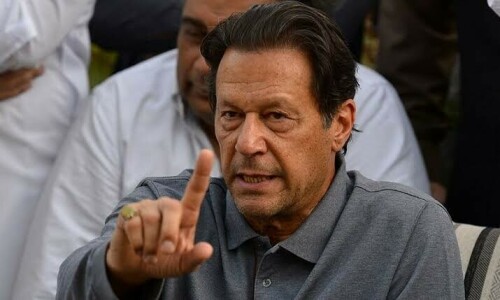UNITED NATIONS, July 2: Iranian Foreign Minister Manouchehr Mottaki on Wednesday raised hopes of reaching a negotiated “multi-faceted solution” with six major powers on its nuclear programme.
“We see the possibility of arriving at a multi-faceted solution,” he told a press conference here while commenting on a revised package of economic and technology incentives put forward by the six powers.
The six powers last month presented Iran with a proposal aimed at ending the crisis which offers technological incentives in exchange for Tehran suspending uranium enrichment, which the West fears could be used to make an atomic bomb.
Mr Mottaki told reporters here that examination of the package presented by EU foreign policy chief Javier Solana to Tehran “will enter the final stage soon”.
“The approach adopted by Mr Solana was different from the past. It was respectful,” he added.
“We will inform the different parties of our decision,” Mr Mottaki said.
Iran’s state-run IRNA news agency quoted Mr Mottaki as saying in an interview with US media in New York on Tuesday that a “new process” was under way in Tehran’s five-year nuclear crisis with the West after Mr Solana’s visit to Tehran last month.
“A process is under way and it started with the package delivered by Iran,” Mr Mottaki said. “This package presented tackled important questions and then on
the other side the world powers offered their own package.”
Iran’s own package is a more all-embracing effort to solve global problems and notably suggests setting up a consortium in Iran for enriching uranium.
Mr Mottaki would not comment on reports that Solana had proposed a “freeze for freeze” formula — under which Tehran would freeze its nuclear enrichment program at current levels in exchange for which there would be no additional sanctions by the UN Security Council — as a prelude to more substantive talks.
In Brussels, Solana described as “interesting” Iran’s reaction to his package, but said he wanted to see an official reply, his spokeswoman said.
“It’s interesting, even though we have not yet received a formal reply” to the international offer of incentives for Iran to suspend uranium enrichment, she said.
On Tuesday a top adviser to Iran’s supreme leader Ayatollah Ali Khamenei spoke out in favour of negotiations with the world powers, who fear that Iran is trying to develop a nuclear weapon.
“It’s interesting that someone who is so close to the supreme leader makes comments of this nature,” Solana’s spokeswoman, Cristina Gallach, said.
“We are hearing new language from Tehran that was not heard before,” Britain’s UN Ambassador John Sawers told reporters. “We don’t yet know what it means.”
On the “freeze for freeze” formula, Sawers said it was designed “to create a climate whereby we can talk about getting into talks”.
“We can have a period of weeks, not specified, a period when the Iranians do not do any augmentation of their nuclear program, don’t add to the number of centrifuges ... and the Security Council does not take any further action on sanctions,” he added.
But his US counterpart Zalmay Khalilzad made it clear that that goal was to arrive at a “verifiable suspension” of Iran’s nuclear enrichment activities.
He said that in exchange, Washington was prepared to talk with Iran, including at a very senior level, on how to settle issues of mutual concern.
Solana has been battling to establish high-level talks aimed at getting Iran to accept the package, but Tehran refuses to suspend enrichment as a precondition for negotiating.
Iran insists it has the right to enrich uranium to make nuclear fuel to help meet its energy needs and has so far defied UN Security Council resolutions which demand it halt the process.
At highly-refined levels, such work can also make the fissile core of an atomic bomb, but Iran insists its nuclear program is peaceful and has vehemently denied that it is seeking to make weapons.—AFP














































Dear visitor, the comments section is undergoing an overhaul and will return soon.